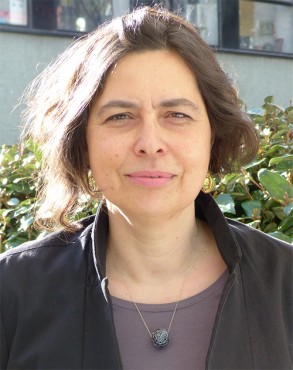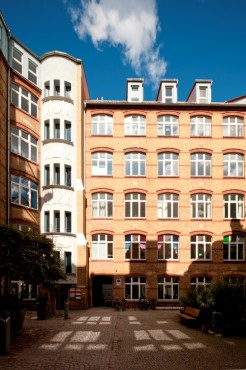Since the beginning of the economic crisis in 2008, there has been a significant increase of women’s self-employment. However, women are still under represented among the self-employed. Obstacles to female entrepreneurship include lack of capital and affordable office space, in particular for small organizations. The women’s cooperative WeiberWirtschaft (women’s economy) was founded to address these problems and enable women to become economically independent. The idea to create a cooperative emerged in the 1980s when a small group of recent graduates and post-graduated discussed the idea of a feminist economy and money cycle. Based on a lot of un-paid voluntary work and significant negotiation skills with a variety of stakeholders the idea of a self-organized center for women founders became reality. Over the course of twenty-five years, the cooperative raised the necessary funds to buy, renovate and extend a historic building (the former socialist cosmetics factory VEB Kosmetik) offering social housing in addition to workplaces. In 2014, the cooperative houses 60 enterprises comprising 150 workplaces. Furthermore, a number of services were established that support the women entrepreneurs, including day care facilities, micro-credit services, a conference center and a mediation unit. In addition, in 2006 the ‘Center for Women Establishing New Businesses’ (GZ) was founded as subsidiary organization. It provides information, consultation and networking opportunities, has so far been contacted by 10.000 women and is supported through the European Social Fund.
The WeiberWirtschaft (WW) is an unusual feminist organization as it is primarily an economic organization rather than a cultural or political organization. Furthermore, it represents a ‘real utopia’, a concept that refers to organizations which are guided by the moral principles of equality, democracy and sustainability. The organizational structure of the cooperative and the low membership shares ensure equality and democracy. Each member – no matter how many shares she owns – has the same voice. Sustainability was a guiding criteria during the renovation and extension of the building. Furthermore, the cooperation engages in intersectional feminist practices: local democratic practices, cooperation between state and community, as well as democratic practices in the transnational context.
What factors and paradoxes contributed to the success of WW and how does this project reflect and inspire feminist transformations?
One of the most important lessons that WW offers is the readiness to cooperate with diverse groups and individuals – or at least to consider it. Social movements, including women’s movements are not always willing to reach out to potential allies and often engage in exclusionary solidarity. The openness to negotiate and to seek support from a range of stakeholders does not mean selling out – the tightrope walk and compromises were (and continue to be) embedded in extensive discussion processes.
Independence plays a decisive role for assuring the integrity of the organization. In my opinion the extensive volunteer work of the founders and other members of the WW is crucial in this respect. The importance of voluntary work for an organization that creates income opportunities for women may seem paradoxical. WW has been very successful in creating jobs – primarily through the creation of affordable offices and work spaces, but also because some of the volunteer service rendered in the administration of the cooperative could be converted into paid jobs. The pivotal role of volunteering assured that the WeiberWirtschaft has not been co-opted and remained independent and true to herself. Moreover, the boundary between paid work and volunteering is extremely thin as the full-time staff have also put a lot of volunteer service in the WeiberWirtschaft. The volunteers have invested a lot – not only time but also money – but they have also gained a lot. Not just an internationally prominent cooperative, but they have also learned a lot, gained skills and experience and thus qualified themselves. The founding of WW documents realism and vision, wit and humor, but also the lust for power and creating an organization. WW is a “learning organization”, members engage critically with themselves and their environment and are very good at finding resources and the support of experts.
One of the most important lessons is certainly that success is not a zero sum game, but that different groups can benefit if one of them is successful. For example, media attention for WW is good for the tenants. Furthermore, the founders’ center does not only benefit the tenants of WW, but women’s companies worldwide. This demonstrates that economic efficiency does not automatically imply competition.
The WeiberWirtschaft is embedded in the transformations of German, European and global women’s movements. The European Union and the United Nations women’s conferences presented transnational opportunity structures that could be used for the implementation of women’s policy demands. An affinity between (liberal) feminism and neoliberalism has been noted: In a tricky way, the demands of women’s movements for self-determination, self-reliance, individual freedom and autonomy are compatible with the logic of globalized markets. What does that mean? Neoliberalism involves the transfer of tasks that were previously the responsibility of the state to private sector or civil society. In addition, neoliberalism is characterized by an emphasis on personal responsibility and efficiency. These features coincide with feminist demands for self-determination and open up possibilities for women’s NGOs and gender consultants. These changes have been described as a shift from state to market feminism. While it is a welcome development that the expertise and services of feminists are paid adequately, the reliance on project and performance-bound funding encompasses the risk of co-optation and depoliticization. As a feminist organization and ‘real utopia’ WeiberWirtschaft is well positioned to practice system-criticism and represent an alternative to lack of solidarity of emancipation interests.
I am anxious to see if and how the WeiberWirtschaft will return to their original idea, the feminist money economy, and to make the earned surplus available to — for example — feminist projects, single mothers, and to people and businesses in the Global South. This would mean that WW would leave market feminism behind and represent an alternative to neoliberal practices, not only by enabling women to become economically independent, but also through the redistribution of resources and re-evaluation of different forms of paid and unpaid work.
Silke Roth is Associate Professor of Sociology in the Department of Sociology, Social Policy and Criminology at the University of Southampton, her research interests include feminist organizations and coalition building. She has observed the formation of the WeiberWirtschaft for over 25 years and is a shareholder of the cooperative.

